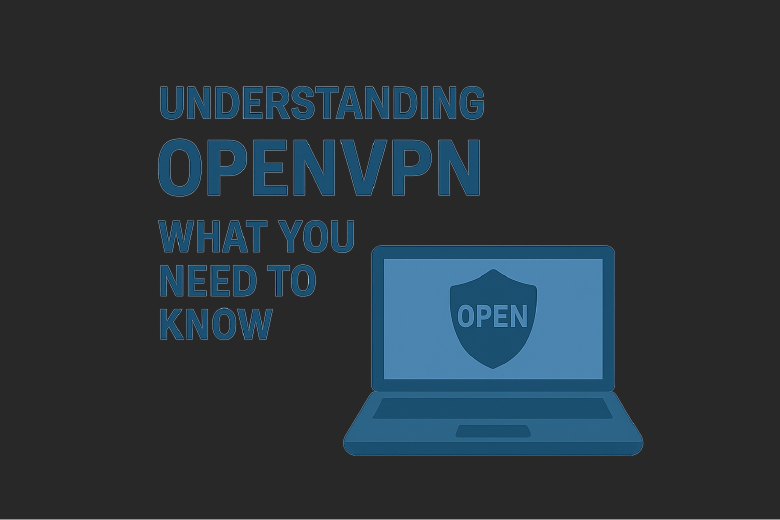Understanding OpenVPN VPN: What You Need to Know

OpenVPN: What It Is and Why You Should Care
If you’ve used a VPN app before, there’s a good chance it was using OpenVPN behind the scenes. It’s one of the most trusted tools in online privacy. In this guide, we’ll break down what OpenVPN is, how it works, how it compares to other VPN protocols, and when it’s the right choice for you.
What Is OpenVPN?
OpenVPN is a VPN protocol. That means it’s a set of rules that decides how your data is encrypted and sent across the internet when you’re using a VPN. Think of it like the secure language your device and the VPN server use to talk to each other.
It first launched in 2001 and is open-source. That means anyone can check its code — and many privacy experts have. Over time, it’s become a trusted option because of this transparency. Bugs get caught and fixed fast, and there’s no mystery about how it works.
Why OpenVPN Matters
It’s Widely Supported
OpenVPN isn’t built into most phones or computers by default. But just about every reputable VPN provider supports it, either in their own apps or with third-party OpenVPN apps. You can use it on Windows, macOS, Linux, iOS, Android, and even many routers.
It’s Secure
OpenVPN uses the same encryption tech as HTTPS websites (via OpenSSL), often with AES-256 — the same encryption used by banks. It creates a secure “tunnel” that hides your data from hackers, ISPs, or anyone else trying to snoop.
It’s Flexible
OpenVPN can run over either UDP or TCP. UDP is faster and great for streaming or gaming. TCP is slower but more reliable and can sneak past VPN blocks because it uses port 443 (the same port HTTPS websites use).
It Uses Authentication
OpenVPN uses certificates or shared keys to verify you’re talking to a real VPN server — not an imposter. Most VPN apps handle this automatically, which helps keep your data safe from tampering.
How It Works (Without the Jargon)
When you click “Connect” in your VPN app, OpenVPN springs into action:
- Your device and the VPN server do a secure handshake using SSL/TLS.
- Then they create an encrypted tunnel.
- Your data is wrapped in an extra layer of protection before it’s sent out.
- Nobody else can read it — not even your internet provider.
From your side, it just feels like your internet works normally, but safer.
Why So Many VPNs Use OpenVPN
1. It’s Proven
OpenVPN has been around for over 20 years. It’s been tested, audited, and reviewed by security experts again and again. It’s earned its place as the default protocol for many VPN services.
2. It’s Open Source
Unlike some protocols made by big tech companies, OpenVPN is fully open. That builds trust, especially when privacy is on the line.
3. It’s Hard to Block
Because it can use any port — including the same one as HTTPS — OpenVPN can get around network restrictions and firewalls. This makes it a good choice if you’re traveling or on a locked-down network.
4. It Helps Protect Your Privacy
In the UK, for example, your ISP can be required to log your browsing activity. A VPN using OpenVPN encrypts your traffic so your ISP can’t see what you’re doing — only that you’re connected to a VPN server.
OpenVPN vs. Other VPN Protocols
WireGuard: The Speed King
WireGuard is newer and built for speed. It uses modern encryption and has much simpler code. On fast internet connections, it’s usually quicker than OpenVPN. But it only runs over UDP, so it’s easier to block in restricted networks.
L2TP/IPSec: Built-In but Slower
This combo is supported by most devices without extra software. It wraps your data twice, which adds security but can slow things down. Some users avoid it due to concerns about past NSA interference in IPSec.
IKEv2/IPSec: Mobile-Friendly
Great for mobile users because it reconnects fast when your network changes (like switching from Wi-Fi to mobile data). Not open-source, but still considered secure. Often the best pick for phones.
PPTP: Don’t Use It
PPTP is outdated and has known security flaws. It’s fast, but only because its encryption is weak. Avoid it unless you have no other option.
SSTP and Others
SSTP is another Microsoft protocol, mostly for Windows. Lightway and other custom protocols (like NordLynx) are based on WireGuard or built from scratch for speed and privacy. These can be great, but support varies.
Which VPN Protocol Should You Use?
- For general use and strong privacy: OpenVPN is the safest bet.
- For the best speed: Try WireGuard (if your VPN offers it).
- For mobile use: IKEv2 or WireGuard work well.
- For restricted networks: OpenVPN over TCP/443 is tough to block.
- For manual setups on old devices: L2TP/IPSec might be your only choice (but avoid PPTP if you can).
The Bottom Line
OpenVPN has stood the test of time. It’s not the fastest, but it’s one of the most secure and flexible VPN protocols out there. If your VPN app is using it, you’re in good hands. But don’t be afraid to try others like WireGuard — especially if your needs lean more toward speed than stealth.
Your VPN’s protocol matters more than most people realise. Now that you know what OpenVPN is — and why it’s still trusted — you can take more control over your online privacy.
